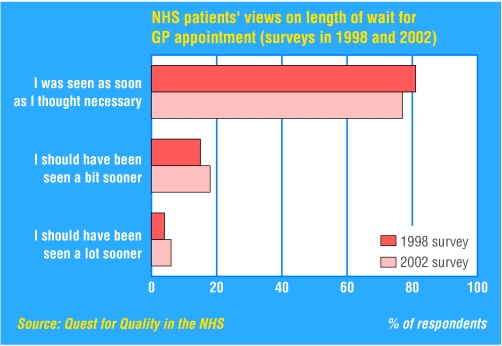The Nuffield Trust this week praised the government for its comprehensive effort to improve the quality of care in the NHS but also called for the setting up of a centre to provide regular independent reports of NHS performance.
Figure 1.
Based on an 18 month research project, the report summarises what the Labour government has achieved since it came to power in 1997.
Figure 2.
Professor Sheila Leatherman, one of the authors and research professor at the School of Public Health at the University of North Carolina, said: “We believe this is the most ambitious comprehensive and intentionally funded national initiative to improve healthcare quality in the world.”
Figure 3.
The report says that the amount spent on quality related initiatives in the NHS since 1999 is more than £835m ($1425m; €1195m).
Figure 4.
The report shows that one of the greatest strengths of the NHS is that few adults are denied health care because of costs. The results of the Commonwealth Fund's international health policy survey carried out in 2002 shows that only 4% of adults with health problems were denied medical care for that reason.
It says that the strengths of the government's drive to improve quality are:
It has been coherent and comprehensive and has depth and breadth
It has been given considerable financial support
A range of organisations and programmes has been developed and implemented, including the National Institute for Clinical Excellence (NICE), the Commission for Healthcare Audit and Inspection (CHAI), the National Patient Safety Agency (NPSA), national service frameworks, and clinical governance
-
Improvements are being shown in several areas.
The report highlighted weaknesses in the NHS that might impede progress:
There is a dearth of good data and insufficient analytic and evaluative capacity in the NHS
Information technology is underdeveloped
Primary care trusts may not produce improvements in quality because they lack experience and expertise
-
Doctors are not yet sufficiently engaged and activated.
The report recommends that the government does the following:
Creates a National Quality Information Centre (QuIC), to provide regular, independent reports of NHS performance in the domains of effectiveness, safety, responsiveness, equity, efficiency, and access. The centre would publish an annual, national quality of care report
Develops a strategy for involving patients and the public and for engaging local communities in NHS governance and policy making
Engages the professions in making quality improvements
Provides support for primary care trusts because they have been given a central position in the quality agenda. They need organisational stability, critical mass, and infrastructure support. See p 1239.
Quest for Quality in the NHS can be obtained from the Nuffield Trust, 59 New Cavendish Street, London W1G 7LP (tel 020 7631 8450).






